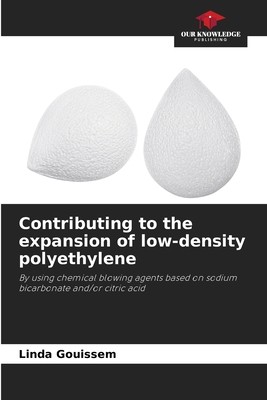
- We will send in 10–14 business days.
- Author: Linda Gouissem
- Publisher: Our Knowledge Publishing
- ISBN-10: 6207125428
- ISBN-13: 9786207125425
- Format: 15.2 x 22.9 x 0.3 cm, softcover
- Language: English
- SAVE -10% with code: EXTRA
Contributing to the expansion of low-density polyethylene (e-book) (used book) | bookbook.eu
Reviews
Description
This work examines how often overlooked factors such as temperature, concentrations and mixing techniques play a crucial role in scientific advances, bridging the gap between theory and practice. It first looks at the thermal behavior of sodium bicarbonate, citric acid and their mixtures, used in the foam industry, using TGA-DSC. It then explores the creation of blends with low-density polyethylene at different concentrations, aiming to determine the optimum combinations to produce new blends and to study their physico-chemical properties. The results indicate that sodium bicarbonate releases more gas, increasing the diameter by up to 60% with 2pcr and up to 30% with 1pcr citric acid. Mixtures based on optimal concentrations, such as 60/40 and 50/50, showed significant synergy, leading to denser, finer and more regular cells.
EXTRA 10 % discount with code: EXTRA
The promotion ends in 17d.01:28:33
The discount code is valid when purchasing from 10 €. Discounts do not stack.
- Author: Linda Gouissem
- Publisher: Our Knowledge Publishing
- ISBN-10: 6207125428
- ISBN-13: 9786207125425
- Format: 15.2 x 22.9 x 0.3 cm, softcover
- Language: English English
This work examines how often overlooked factors such as temperature, concentrations and mixing techniques play a crucial role in scientific advances, bridging the gap between theory and practice. It first looks at the thermal behavior of sodium bicarbonate, citric acid and their mixtures, used in the foam industry, using TGA-DSC. It then explores the creation of blends with low-density polyethylene at different concentrations, aiming to determine the optimum combinations to produce new blends and to study their physico-chemical properties. The results indicate that sodium bicarbonate releases more gas, increasing the diameter by up to 60% with 2pcr and up to 30% with 1pcr citric acid. Mixtures based on optimal concentrations, such as 60/40 and 50/50, showed significant synergy, leading to denser, finer and more regular cells.


Reviews